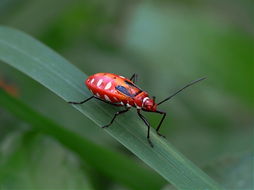
Insect Bite is Hard
Have you ever experienced the discomfort and inconvenience caused by an insect bite? It’s a common occurrence that can range from a minor annoyance to a severe allergic reaction. In this article, we will delve into the various aspects of insect bites, including their causes, symptoms, treatment, and prevention methods.
Understanding Insect Bites

Insect bites occur when an insect injects its saliva into your skin while feeding. This saliva can cause irritation, itching, and inflammation. Common insects responsible for bites include mosquitoes, ticks, bed bugs, fleas, and bees.
Causes of Insect Bites

There are several reasons why insects bite humans. Some of the most common causes include:
| Reason | Description |
|---|---|
| Feeding | Insects like mosquitoes and ticks feed on human blood to obtain nutrients. |
| Defense | Some insects, such as bees and wasps, bite as a defense mechanism when threatened. |
| Parasitism | Bed bugs and fleas bite humans to feed on their blood, which helps them survive. |
Symptoms of Insect Bites

The symptoms of an insect bite can vary depending on the type of insect and the individual’s immune response. Common symptoms include:
- Redness and swelling at the bite site
- Itching and irritation
- Pain or a burning sensation
- Small, raised bumps or blisters
- In some cases, hives or a rash may develop
Treatment of Insect Bites
Most insect bites can be treated at home with simple measures. Here are some effective treatment options:
- Cool the bite site with ice or a cold compress to reduce swelling and pain.
- Apply an antiseptic ointment or cream to prevent infection.
- Take an over-the-counter pain reliever, such as ibuprofen or acetaminophen, to alleviate pain and inflammation.
- Use an antihistamine cream or oral medication to reduce itching and irritation.
- Keep the bite site clean and dry to prevent infection.
Prevention of Insect Bites
Preventing insect bites is crucial, especially if you are prone to allergic reactions or have sensitive skin. Here are some effective prevention methods:
- Wear long-sleeved shirts and pants when outdoors, especially during peak insect activity times.
- Use insect repellents containing DEET, picaridin, or oil of lemon eucalyptus to deter insects.
- Keep your home and yard free of standing water, as it attracts mosquitoes.
- Seal gaps and cracks in your home to prevent insects from entering.
- Inspect your clothing and bedding for signs of insects, such as bed bugs or fleas.
When to Seek Medical Attention
In some cases, an insect bite may require medical attention. Seek immediate medical help if you experience any of the following symptoms:
- Severe swelling, redness, or warmth at the bite site
- A large, painful bump or boil
- Difficulty breathing or swallowing
- A widespread rash or hives
- Signs of infection, such as pus or fever
In conclusion, insect bites can be a nuisance, but with proper understanding and prevention measures, you can minimize your risk of experiencing them. By following the tips outlined in this article, you can enjoy a bite-free summer and beyond.







